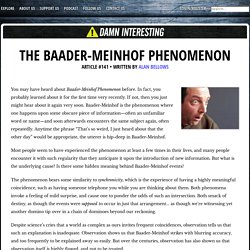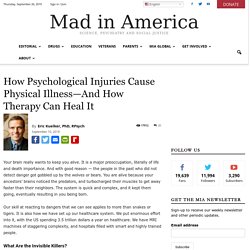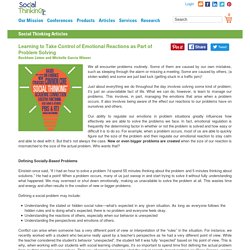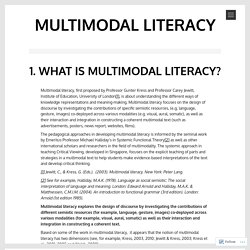

Why Facts Don’t Change Our Minds. Why you think you’re right, even when you’re wrong. Anna Parini Imagine for a moment you’re a soldier in the heat of battle — perhaps a Roman foot soldier, medieval archer or Zulu warrior.

Regardless of your time and place, some things are probably constant. Your adrenaline is elevated, and your actions stem from your deeply ingrained reflexes, reflexes that are rooted in a need to protect yourself and your side and to defeat the enemy. Now, try to imagine playing a very different role: the scout. How Smartphones Hijack Our Minds.
The Baader-Meinhof Phenomenon. You may have heard about Baader-Meinhof Phenomenon before.

In fact, you probably learned about it for the first time very recently. If not, then you just might hear about it again very soon. Baader-Meinhof is the phenomenon where one happens upon some obscure piece of information—often an unfamiliar word or name—and soon afterwards encounters the same subject again, often repeatedly. 10 Psychological States You've Never Heard Of... and When You Experienced Them. Is slavery wrong? - Atheist Alliance International. Recently a Muslim asked me, “Why is it bad to own slaves?”

It’s a good question and it needs an answer. What religions tell us Both Christians and Muslims can answer this question from their holy scriptures, and both would find similar answers. What Is Consciousness? How Psychological Injuries Cause Physical Illness—And How Therapy Can Heal It. Your brain really wants to keep you alive.

It is a major preoccupation, literally of life and death importance. And with good reason — the people in the past who did not detect danger got gobbled up by the wolves or bears. Dissonance cognitive. Un article de Wikipédia, l'encyclopédie libre.

Man Uses His Schizophrenia to Gather Clues for Daily Living. 8 Things About Concentrating. “Music helps me concentrate,” Mike said to me glancing briefly over his shoulder.

Mike was in his room writing a paper for his U.S. History class. On his desk next to his computer sat crunched Red Bulls, empty Gatorade bottles, some extra pocket change and scattered pieces of paper. In the pocket of his sweat pants rested a blaring iPod with a chord that dangled near the floor, almost touching against his Adidas sandals. On his computer sat even more stray objects than his surrounding environment. Mike made a shift about every thirty seconds between all of the above. The Science of Why Swearing Physically Reduces Pain. Size of my Problem.ashx (JPEG Image, 667 × 1000 pixels)
The size of my problem thermometer. We all encounter problems routinely.

Some of them are caused by our own mistakes, such as sleeping through the alarm or missing a meeting. Some are caused by others, (a stolen wallet) and some are just bad luck (getting stuck in a traffic jam)! Just about everything we do throughout the day involves solving some kind of problem; it’s just an unavoidable fact of life. What we can do, however, is learn to manage our problems. This involves, in part, managing the emotions that arise when a problem occurs. Our ability to regulate our emotions in problem situations greatly influences how effectively we are able to solve the problems we face. Defining Socially-Based Problems Einstein once said, “If I had an hour to solve a problem I'd spend 55 minutes thinking about the problem and 5 minutes thinking about solutions.”
Defining a social problem may include: How Forgiveness Can Change Your Life. By Dr.

Peter Breggin 01/02/2013 Early in 1865, in his second inaugural address, little more than a month before his assassination, Abraham Lincoln stood before the bloodied, fractured United States to speak about forgiveness, the letting go of hatreds, and the binding of wounds. Psychiatric Drug Facts. By Dr.

Peter Breggin 09/26/2013 Hopelessness about life is the ultimate reason many people take their own lives. Among the military, as in civilian life, suicide often results when individuals feel isolated, abandoned, and without hope. What are the stages of Meditative Concentration? 1. What is Multimodal Literacy? – Multimodal Literacy.
Multimodal literacy, first proposed by Professor Gunter Kress and Professor Carey Jewitt, Institute of Education, University of London[1], is about understanding the different ways of knowledge representations and meaning-making.

Multimodal literacy focuses on the design of discourse by investigating the contributions of specific semiotic resources, (e.g. language, gesture, images) co-deployed across various modalities (e.g. visual, aural, somatic), as well as their interaction and integration in constructing a coherent multimodal text (such as advertisements, posters, news report, websites, films). The pedagogical approaches in developing multimodal literacy is informed by the seminal work by Emeritus Professor Michael Halliday’s in Systemic Functional Theory[2] as well as other international scholars and researchers in the field of multimodality.
. [1] Jewitt, C., & Kress, G. (Eds.). (2003). Some paradoxes - An Anthology. Logical Paradoxes. Lateral Thinking Puzzles. Lateral thinking puzzles that challenge your preconceptions. ViewPort. Focusing on Open Focus: Part 1 What is Open Focus? The Open Focus theory (four attention styles) Hold That Wisp. Imaginings. Memento. Moving Moments. Zazen. Creatively. Diagrammatically. Emotive Patterning. Esoteric Terms. Etudesque.
Erudite Excellence. Evolving. Sensitivities Play. Anapanasati. PhiloSophia. Vitality. Wordsworth. Pathways. Quantum Playground.
Brain Ideas. Brains Map Ideas. Artificially Intelligent. Mist. Music Minds. Informed Opinions. Possibilities.
PSYCHe Labs. Yoganini. Oppositional Defiance. Revolutionary Love.